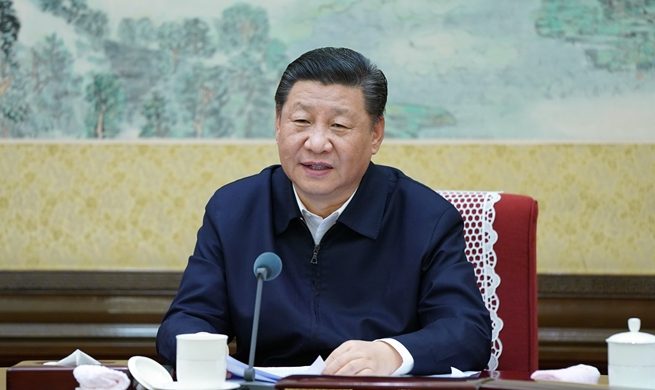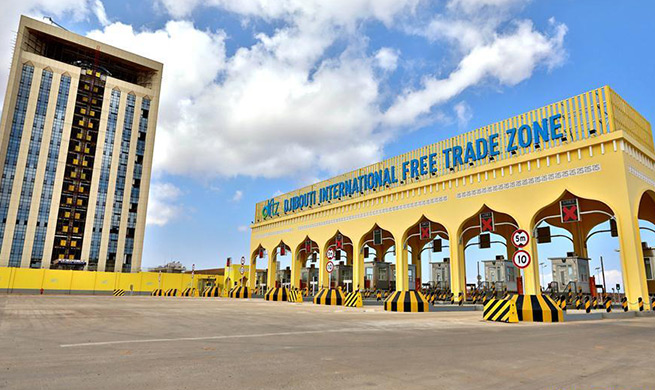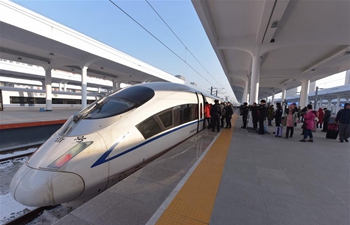BEIJING, Dec. 27 (Xinhua) -- China has started strong in the "three tough battles" against major risks, poverty and pollution despite greater downward pressure and external uncertainties this year.
A key economic meeting which charted a course for the Chinese economy in 2019 has declared that the country has won "the initial victory in its three tough battles," and targeted efforts will be taken next year.
The campaigns will not only ensure the establishment of a moderately prosperous society by 2020 but also help the world's second-largest economy achieve high-quality growth in the long haul.
RISKS IN RETREAT
A guideline released November by the central bank promised to improve China's framework for supervising systemically important financial institutions, prevent systemic risks and maintain the prudent performance of the financial system.
It was one of the major measures taken by regulators to forestall and defuse major risks such as excessive leverage, mounting non-performing loans and lurking dangers of the shadow banking system.
Shadow banking has declined sharply since the beginning of the year, level of local government debt is well within the official limit and the securities authority has beefed up crackdowns on market violations, to name a few.
Current financial risks have generally retreated, and initial success has been achieved in amending financial dysfunction, according to a report on China's financial stability in 2018 by the People's Bank of China, the central bank.
"In 2019, institutional risks will be steadily addressed and the foundation for financial stability will become more solid," the report said.
"Since 2017, a series of measures to prevent and defuse financial risks have achieved remarkable results. On the whole, China's economic and financial risks are controllable and there will be no systemic risks," said Zhou Xuedong, director of the central bank's financial stability bureau.
"INVALUABLE ASSETS" APPRECIATED
A tone-setting meeting on environmental protection held in May announced China's greater resolve in fighting against pollution and pushing ecological civilization to "a new level."
The country has deployed more firepower to this front in 2018 by introducing the environmental protection tax in January. In addition, the new Ministry of Ecology and Environment is responsible for the protection of freshwater, land, air and oceans, a three-year action plan to curb air pollution was put in place in July and the first dedicated law to soil pollution prevention and control was put in motion in August.
As "clear waters and lush mountains are invaluable assets," China is seeking better coordination between economic and social development and ecological civilization and has delivered visible and breathable results.
In the first 10 months, Chinese cities have had more days with good air quality than last year, while the density of PM2.5, a key indicator of air pollution, dropped by 7.5 percent, official data showed.
In the first three quarters, investment into ecological conservation and environmental treatment surged by 33.7 percent year on year, 28.3 percentage points higher than the overall investment growth rate, according to the National Bureau of Statistics (NBS).
"The investment has become a shining engine of China's high-quality economic development," NBS spokesperson Mao Shengyong said.
WIPING OUT POVERTY
The battle against poverty is one of the "three tough battles" that China must win to build a moderately prosperous society in all respects by 2020. To achieve the goal, the country needs to lift around 30 million poor rural residents out of poverty between 2018 and 2020.
By the end of this year, the number of people living in poverty in rural areas will be reduced by more than 85 percent, poverty-stricken villages by about 80 percent and poverty-stricken counties by more than 50 percent, according to the leading group of poverty alleviation under the State Council.
Since 1978, China has lifted 740 million people out of poverty, reducing the poverty headcount ratio by 94.4 percentage points. The country is committed to lifting the entire poor rural population out of poverty by 2020.
Graham Allison, founding dean of Harvard's John F. Kennedy School of Government, used the word "miracle" to describe China's poverty reduction efforts.
Allison said China has set a successful example for poverty reduction in the world. "If I have to choose the best of China's countless achievements, I would choose poverty reduction."

















